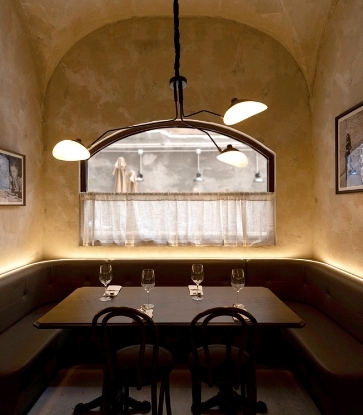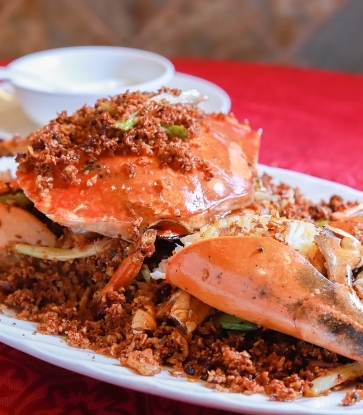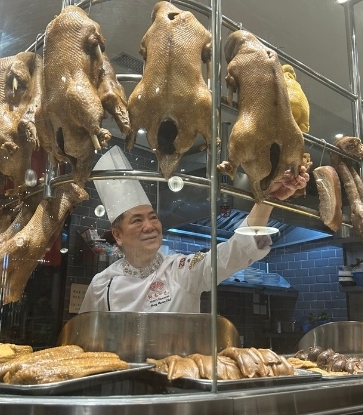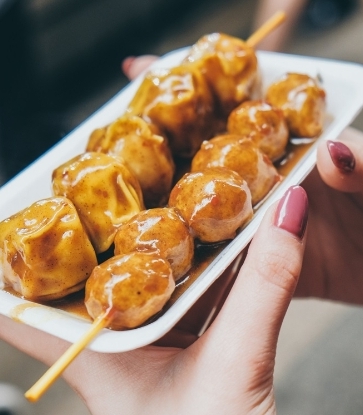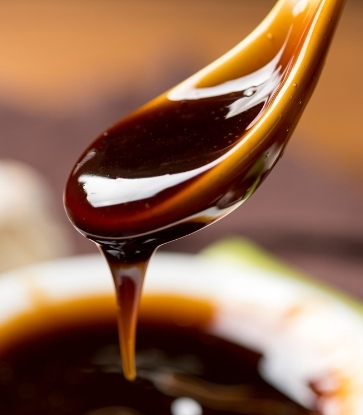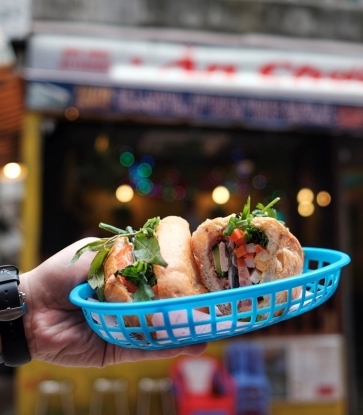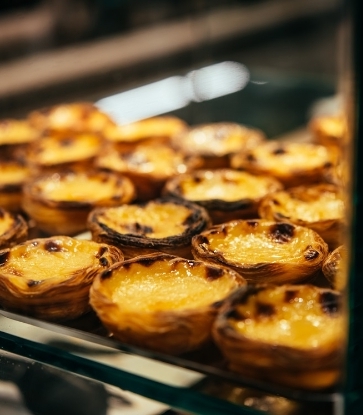"I never thought I would win! The first thing I did was to celebrate by popping open a bottle of champagne!” exclaims Jacky Luk, sommelier of three-MICHELIN-star Forum in Hong Kong.
Luk is also the winner of the MICHELIN Guide Hong Kong and Macau’s inaugural Sommelier Award this 2023, and he relives that fateful moment when he gratefully received the award from Mr. Tony Atayde, Marketing Director of Pernod Ricard Hong Kong and Macau. Pernod Ricard owns a comprehensive portfolio of brands, including the famous Perrier-Jouët. “I am thrilled to receive this honour, especially since this is the first time that the MICHELIN Guide has given out this award in Hong Kong and Macau," Luk expresses.
"We are proud to recognise the important role of sommeliers in enhancing the dining experience. They bring expertise, artistry, and passion to their craft, elevating the enjoyment of food and wine," said Mr. Tony Atayde on the stage.
Each day, Luk arrives at the restaurant early in the morning and busies himself with polishing crystal glasses and jotting down wines for the day’s recommendation before getting his suit neat and tidy for service. This has been his routine every day for the past seven years. “I’ve been a sommelier for 10 years now, and seven of those have been at Forum. You can say that I grew up here, but compared to other colleagues who have worked here for over 20 or 30 years, I’m still relatively new.”
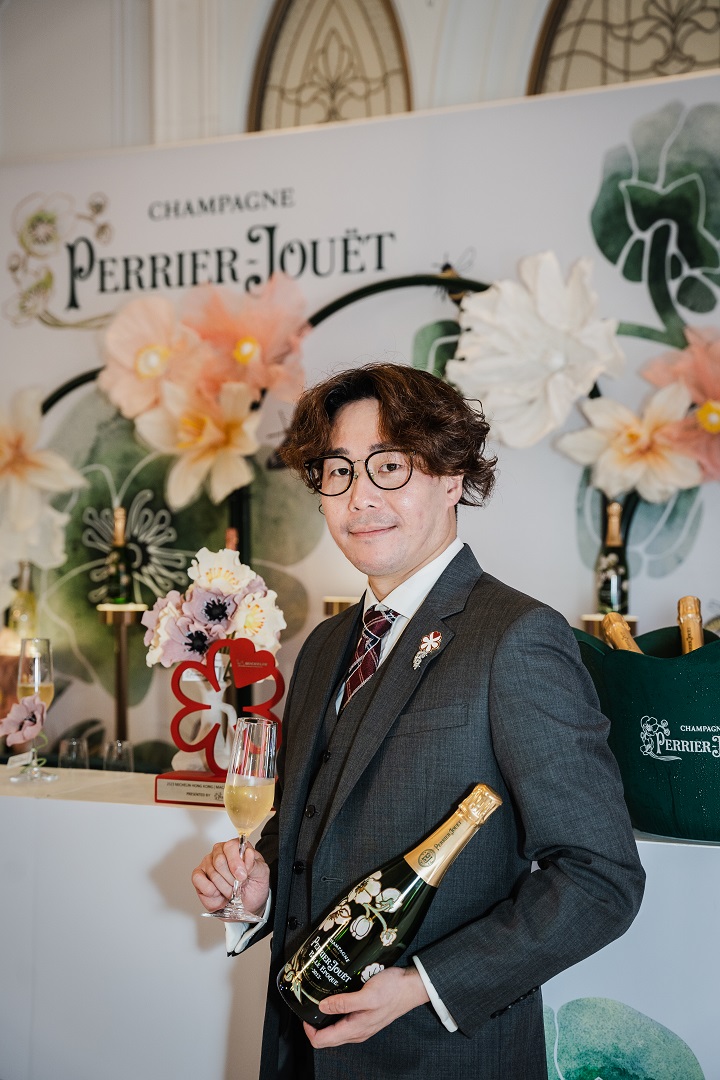
From Drinking Wine in a Coffee Cup to Becoming a Top-Tier Sommelier
Luk started out as a waiter. He unabashedly shares that he used a coffee cup when he first drank wine, which made his colleagues laugh and scold him for not respecting the grapes. "At that time, I thought it didn't matter what cup I used — it's just wine,” he shares. “I thought wine tasted strange at first. Then, one time, I drank a 1990 La Tâche — also in a coffee cup! — but for this particular wine, I found the taste to be very different; different in a good way,” he recalls.
Luk continues to share that as a child, he wasn't very diligent when it came to studying. It wasn't until he got into the field of wine that he truly found something he could fully dedicate himself to. Working in a restaurant provided him with the perfect opportunity to understand wine, and his love for the grape grew over time. He then made up his mind to learn more about it and pursue a sommelier certificate.
When Luk had just started working at Forum, he took a deep dive and learned about the brand’s history and culture. He admitted that developing a wine list that would please both the customers and management was rather challenging. The restaurant’s wine list at the time was very traditional, and there were only Bordeaux wine glasses. “You could only use a Bordeaux glass even if you’re drinking a top-notch Burgundy, so don’t even get me started on the concept of being a sommelier,” he quips.
Starting from scratch, Luk single-handedly designed Forum’s professional wine list, and he is grateful for the trust from both the restaurant’s owner and patrons. “I don’t set the prices too high. If it’s too expensive, guests might bring their own wines to the restaurant and miss out on our professional sommelier service,” says Luk.

Flexibility is Key: Pairing Wine with Cantonese Cuisine
Pairing wine with Cantonese food is never easy. Chinese cooking techniques vary greatly. From pan-frying, stir-frying and boiling; to deep-frying, braising, and stewing, each technique is unique.
For example, lobster can be pan-fried, stir-fried, boiled, or deep-fried; and the choices of sauce can range from simple soy sauce to decadent cheese. Hence, wine pairings go beyond the ingredient and must take the cooking method into account.
“For steamed lobster, I tend to choose a more refreshing white wine with high acidity. For lobster baked with cheese and butter, I would recommend a more full-bodied white wine,” Jacky explains. “If the lobster is cooked in soy sauce — and since the soy sauce we use at Forum has a hint of sweetness and is very rich — a red wine actually works well.”

Luk further illustrates his point using Forum’s signature dish, Ah Yat Abalone, as an example. Fresh abalone is not very flavourful and has a prominent brininess, which usually pairs well with bright, high-acid white wines. On the other hand, dried abalone is packed with umami, which doesn’t work with high-tannic wines, and the combination will result in a metallic taste.
Luk has tried many different wine pairings, and has found aged Spanish Rioja red wines to be the ultimate match for dried abalone. “Wines aged for 30 to 40 years develop an umami sensation of their own. The tannins soften over time, which provides great synergy with the umami of the dried abalone, taking the flavours of both the wine and the dish to the next level,” he explains.
Among all the wines, Luk has a great passion for champagne. He mentions that champagne can be paired with a wide range of dishes, including appetisers, dim sum, and refreshing seafood dishes. He personally enjoys champagne, too, citing that the effervescence from champagne brings him joy and a refreshing sensation that sweeps away the hot weather in Hong Kong. Luk likes to discover champagnes from small-scale vineyards, as well as to use white wine glasses to savour the bubbly because it enhances the aroma. "Personally, I enjoy champagnes with sharp acidity and a refreshing profiles," he adds.
“Good wine does not necessarily equate to expensive wine. It’s all about finding a wine that elevates the taste of the dish and complements it perfectly.”

Challenges Faced by Sommeliers in Hong Kong
It’s quite common for guests in Hong Kong to bring wines from their prized collections to restaurants, thinking that their own wines are better, or that the corkage fee is cheaper than buying bottles from the restaurant. “This is a huge challenge for the survival of restaurants. Imagine if all customers want to bring their own wines. The restaurant’s beverage profits will be significantly reduced, while the rent keeps going up. Operations become more difficult, and it could get stuck in a vicious cycle,” Luk shares.
Once appointed, Luk took the effort to get to know the restaurant’s guests and tried to help them understand the new wine list. “Once they’ve tried my wine pairings, they’ll quickly trust me. Some guests who mostly drank Bordeaux or only liked wines from big labels are now starting to try wines from other regions like Italy. They’ll try pairings with champagne, huadiao, sake, and so on.”
For a guest who insists on having wines that don’t pair well with their food: “We are part of the food and beverage service industry, so it is imperative that guests enjoy their meals. If they want to have red wine with steamed fish, even though I know they’re a complete mismatch, I’ll try my best to accommodate them or get them to try a white wine that I recommend. Once they’ve tried it and liked it, they will most certainly go with my suggestion again. It’s crucial to build mutual trust,” Luk says as he points to the wine cabinet behind him.

Forum may be a long-standing establishment, but Luk and the restaurant continue to innovate and seek opportunities for improvement. For its 40th anniversary, the Forum launched a special-edition champagne in a cross-industry collaboration; and at the start of 2023, the restaurant released a dried tangerine peel cognac inspired by the traditional Chinese practice of infusing liquor with different ingredients, and Luk was involved in the creative process.
“You can innovate all you want, but the creation must be something suitable for your guests and the restaurant. When introducing new wines and spirits, the first thing I consider is whether I personally find this wine enjoyable. And then, it comes down to its selling points. Why would customers want to drink this? Taking the very trendy natural wine as an example. It’s not suitable for our clientele, so we won’t blindly follow the trend,” he says.
More Opportunities for Young People
Nowadays, the biggest challenge faced by sommeliers is the fact that fewer and fewer young people are entering the profession. This is causing a gap as older sommeliers retire. “Working hours in Hong Kong are long and comparatively demanding. Sommeliers often have to study for exams and do wine tasting every day, so they’re not able to enjoy life as much as they would like to. It really does take a lot of passion and determination — you really need to love it. Young people may be hesitant to become sommeliers, so I worry that the number of sommeliers in Hong Kong will decline,” Luk says. He hopes that customers in Hong Kong can give more opportunities to young sommeliers by trying their wine pairings and letting them showcase their skills.
Luk further encourages young sommeliers to acquire more wine knowledge through different ways. Apart from books and information from the internet, he recommends the 2012 film Somm. “Every time I watch this, it brings back memories of when I first started out. It reminds me of my passion and encourages me to keep going," he says. Luk shares that this documentary is about four working sommeliers preparing for their Master Sommelier exam, as well as all the difficulties they’ve had overcome to get there. And as Luk is taking his Master Sommelier exam this October, too, he shares,"I hope I can rise to the challenge and be like the characters in the film!”
Looking into the future, Luk believes that he will continue to pursue his current path as a sommelier. “I was never good at studying when I was young, but now I found a profession that I am good at and can specialise in,” he says humbly. “I really enjoy sharing my love for wine with others. I really love being a sommelier!”
The article was written by Gloria Chung and translated by Iris Wong. Read original article here.








